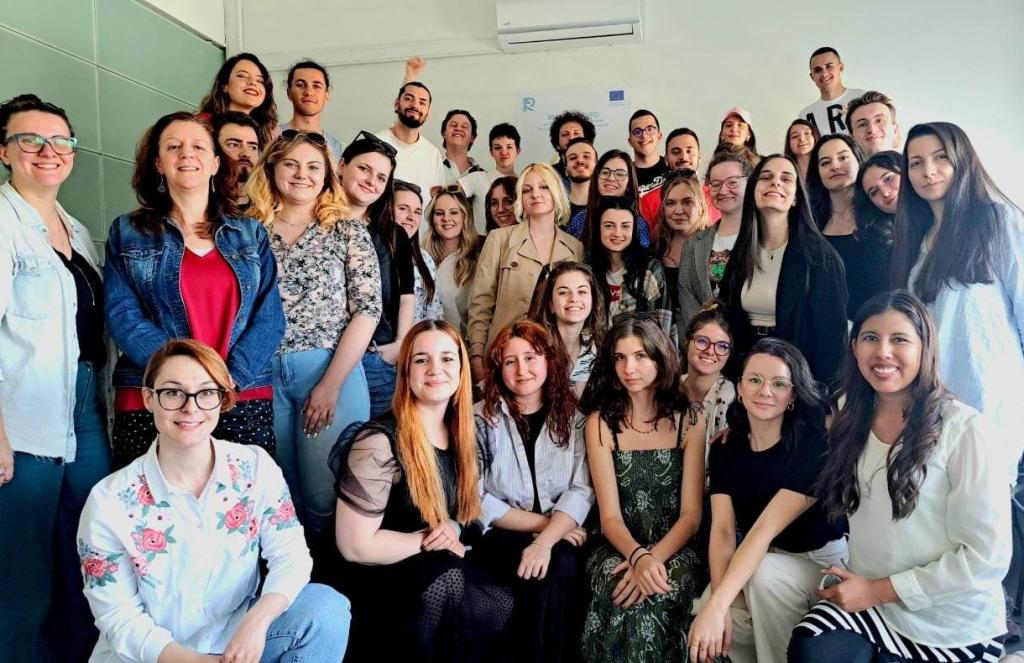Thessaloniki gets ready for its metro launch in November
The underground rapid transit lines have been under construction for almost two decades due to various project delays
 TheMayor.EU logo
TheMayor.EU logo 
Group photo of the participants before they go home to better their communities, Source: Ana Oliveira / LUSOFONA University
Ready for stage two: 30 youngsters from Bulgaria, Croatia and Romania will spread best practices from Germany and Portugal and build up media literacy in their home countries
This week, Read Twice, a project that seeks to increase media literacy and tackle disinformation, took 30 young media professionals from Bulgaria, Romania and Croatia to their second and final capacity-building seminar in Porto, Portugal.
The seminar was organised by LUSOFONA University and is the last big stage before these professionals have to hold training workshops in their own countries.
Read Twice is co-funded by the European Union under the CERV programme (Citizens, Equality, Rights and Values). It aims to help transfer good practices in media literacy and anti-disinfo action from Germany and Portugal to Bulgaria, Croatia and Romania.
Germany and Portugal are two countries that have very robust mechanisms for tackling false information and consistently rank high in both media literacy rankings and press freedom indexes. According to Reporters Without Borders, in 2022, Portugal ranked 7th in the world in terms of press freedom, while Germany ranked 16th.
At the same time, Croatia ranked 48th, Romania was 56th and Bulgaria was 91st - putting it at the second worst spot in the EU, after Greece, which ranked 108th.
In Germany, the training was hosted by Alliance4Europe and focused on developing skills, learning techniques and adapting to new tools for fact-checking and bias recognition. This included a methodology from Deutsche Welle, as well as the platforms DISARM and Public Editor.
In Porto, the participants worked to develop their presentational skills, organising their knowledge, as well as presenting the tools to an audience, and mapping the audience and their specific issues in a digital and convergent cultural environment.
Now, each team of 10 (hailing from their corresponding countries) will develop training sessions and share the knowledge and best practices with their peers, to develop a more informed and resilient society.
In Porto, the participants learned about #Infomedia, a student-run media outlet where young people from LUSOFONA University can hone their skills and develop a portfolio. While the outlet was initiated by university professors, it is now maintained and edited by the students, who, in turn, have a chance to dive deep into topics and experiment with feature journalism.
The participants also listened to a lecture from Vanessa Rodrigues, a documentarian, university professor and journalist about developing a multimedia narrative experience, treating a story with a post-modern non-linear style.
On the second day, the young media professionals visited the Porto-based Radio Nova and the Porto editorial room of the Publico newspaper. There, veteran professionals discussed journalistic due diligence practices with limited resources and keeping a media outlet afloat and with consistent quality output amid the age of free digital journalism.
Lastly, the participants developed and presented their ideas and training programmes for their own countries, including target groups, duration, content and approach.
The project will run from November 2022 to March 2024. Apart from the training sessions and good practices, it features a social media outreach programme, aiming to translate all project knowledge into content thus reaching much more young people around the world from very different contexts and backgrounds.
Read Twice is coordinated by Euro Advance Association from Bulgaria, with partners Udruga Echo (Croatia), Se Poate (Romania), the Alliance4Europe (Germany) and Cicant (Portugal) and is co-funded by the European Union.

The underground rapid transit lines have been under construction for almost two decades due to various project delays

Now you can get your wine in Talence by paying directly in Bitcoin

That’s because the state has to spend money on updating the railway infrastructure rather than subsidizing the cost of the popular pass

Rethinking renewable energy sources for the urban landscape

The examples, compiled by Beyond Fossil Fuels, can inform and inspire communities and entrepreneurs that still feel trepidation at the prospect of energy transition

Now you can get your wine in Talence by paying directly in Bitcoin

The 10th European Conference on Sustainable Cities and Towns (ESCT) sets the stage for stronger cooperation between the EU, national and local level to fast track Europe's transition to climate neutrality.

At least, that’s the promise made by the mayor of Paris, Anne Hidalgo

The underground rapid transit lines have been under construction for almost two decades due to various project delays

At least, that’s the promise made by the mayor of Paris, Anne Hidalgo

Hostal de Pinós is located in the geographical centre of the autonomous region

Despite its church-y name, the district has long been known as the hangout spot for the artsy crowds

Urban dwellers across the EU are having a say in making their surroundings friendlier to people and the environment.

Forests in the EU can help green the European construction industry and bolster a continent-wide push for architectural improvements.

Apply by 10 November and do your part for the transformation of European public spaces

An interview with the Mayor of a Polish city that seeks to reinvent itself

An interview with the newly elected ICLEI President and Mayor of Malmö

A conversation with the Mayor of Lisbon about the spirit and dimensions of innovation present in the Portuguese capital














